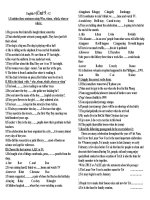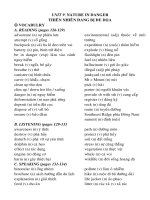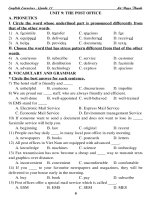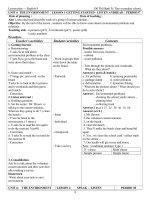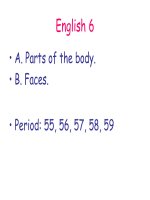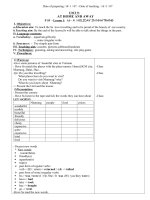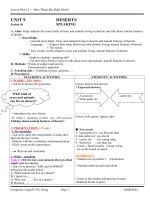E10CB UNIT 9:TV,NP,BT
Bạn đang xem bản rút gọn của tài liệu. Xem và tải ngay bản đầy đủ của tài liệu tại đây (126.21 KB, 7 trang )
/>UNIT 9: UNDERSEA WORLD
I. VOCABULARY
A. READING (pages 94-96)
analyse (v) phân tích maintain (v) duy trì
at stake (exp) bò đe dọa major (adj) chính yếu
balanced (adj) cân bằng marine (adj) (thuộc) biển
bay (n) vònh mysterious (adj) bí ẩn
beneath (prep) bên dưới mystery (n) điều bí ẩn
biodiversity (n) đa dạng sinh học organism (n) sinh vật
bottom (n) đáy (biển) overcome (v) vượt qua
challenge (v/n) (sự) thử thách oversived (adj) quá cỡ
cover (v) bao phủ part (n) phần
current (n) dòng chảy percentage (n) tỉ lệ phần trăm
depth (n) độ sâu precious (adj) quý, hiếm
device (n) thiết bò provide (v) cung cấp
discovery (n) khám phá sample (n) mẫu vật
devide (v) chia satellite (n) vệ tinh
exist (v) tồn tại seabed (n) đáy biển
experiment (n) thí nghiệm starfish (n) sao biển
extremely (adv) cực kỳ, rất submarine (n) tàu ngầm
fall into (v) chia thành surface (n) bề mặt
form (v) hình thành surround (v) bao quanh
gulf (n) vònh remperature (n) nhiệt độ
huge (adj) to lớn term (n) thuật ngữ
investigate (v) thám hiểm three-quarters (n) ba phần tư
jellyfish (n) con sứa tiny (adj) rất nhỏ
lie (v) nằm unless (adv) trừ phi
live on (v) sống nhờ vào wide range (n) lượng lớn
B. SPEAKING (page 97)
butt (n) mẩu thuốc lá endanger (v) gây nguy hiểm
( còn laiï) explosive (n) chất nổ
consequence (n) hậu quả fertilizer (n) phân bón
dispose of (v) vứt bỏ fishing line (n) dây câu
dustbin (n) thùng rác responsibly (adv) một cách
harm (v) gây hại rubbish (n) rác
herbicide (n) thuốc diệt cỏ seafood (n) hải sản
limit (v) có giới hạn smart (adj) thông minh
net (n) lưới solution (n) giải pháp
perticide (n) thuốc trừ sâu sparingly (adv) 1 cách tiết kiệm
plastic (adj) làm bằng chất dẻo
pollute (v) làm ô nhiểm species (n) giống, loài
proper (adj) thích hợp still (v) làm tràn, đổ
release (v) thả tanker (n) đe dọa
responsibly (adv) một cách threaten (v) đe dọa
C.LISTENING (pages 98-99)
comission (n) ủy ban mammal (n) động vật có vú
conservation (n) sụ bảo tồn migrate (v) di cư
decrease (n/v) (sự) giảm bớt take measures (n) áp dụng biện pháp
feeding ground (n) nơi cung cấp weight (n) trọng lượng
thức ăn whaling (n) việc săn cá voi
length (n) chiều dài
D. WRITING (pages 99-101)
accidential (adj) tình cờ female (adj/n) giống cái
at risk (exp) đang gặp nguy hiểm
brain (n) bộ não gestation period (n) thời kỳ thai nghén
calf (n) con give birth to (exp) sinh con
(của cá nhà táng) habitat (n) môi trường sống
carnivore (n) động vật ăn thòt life span (n) quãng đời
concern (n) mối quan tâm male (adj/n) giống đực
diet (n) thức ăn hàng ngày
entrapment (n) sự mắc bẫy sperm whale (n) cá nhà táng
feeding habit (n) thói quen ăn squid (n) con mực
(ăn cái gì, nhiều hay ít)
E. LANGUAGE FOCUS (pages 101-103)
close down (v) đóng cửa press (v) nhấn
(ngừng sx) refuse (v) từ chối
disappointed (adj) thất vọng resign (v) từ chức
frightened (adj) sợ ring (n) chiếc nhẫn
gun (n) cây súng salary (n) tiền lương
offend (n) xúc phạm surprised (adj) bò ngạc nhiên
offer (v) tặng/giao cho upsed (adj) buồn bã
out of work (exp) mất việc
II. GRAMMAR
1. Should / Shouldn’t (nên / không nên)
Dùng để khuyên ai đó nên hay không nên làm việc gì
Ex: - He looks very tired. He should visit his doctor.
(He looks very tired. I think he should visit his doctor.)
- It’s raining heavily. You shouldn’t go out right now.
(It’s raining heavily. I don’t think you should go out right now.)
2. Conditional sentence type 2 (Câu điều kiện loại 2)
Dùng để diễn tả hành động KHÔNG thể xảy ra ở hiện tại hoặc tương lai.
Ex: - He doesn’t have enough money. He will not buy this new bicycle.
--> If he had enough money, he would buy this new bicycle.
(He would buy this new bicycle, if he had enough money.)
- I am not bird. I can’t fly everywhere.
--> If I were a bird, I could fly everywhere.
(I could fly everywhere if I were a bird.)
Công thức:
If clause ( Mệnh đề If) Main clause (mệnh đề chính)
S + V2/ED/WERE S + WOULD/COULD + V
* LƯU Ý:
- Mệnh đề IF và mệnh đề chính có thể đổi chỗ cho nhau.
- Dùng WERE cho tất cả các ngôi trong mệnh đề IF.
UNIT 9: UNDERSEA WORLD
A. PHONETICS
I. Choose the word whose underlined part is pronounced differently from
that of the other words.
1) A. dear B. clear C. year D. bear
2) A. here B. where C. wear D. pair
3) A. group B. tour C. poor D. sure
II. Choose the word that has stress pattern different from that of the other words.
4) A. ocean B. divide C. modern D. water
5) A. pacific B. satellite C. century D. animal
6) A. organism B. investigate C. diversity D. technology
B. VOCABULARY AND GRAMMAR
I. Choose the best answer to complete each sentence.
7) The prefix sub in the word submarine means ………..………….. .
A. again B. under C. above D. none
8) The United Kingdom is divided ………………….………. 4 parts: England,
Scotland, Wales and Northern Ireland.
A. between B. among C. into D. for
9) Carnivores are animals which …………………………. .
A. eat meat B. eat plants C. swim very fast D. live on the bottom
10) The sea is polluted, which …………………….. sea plants and animals.
A. dangers B. dangerous C. dangerously D. endangers
11) The starfish live on or depend ……………………….. the bottom.
A. in B. for C. on D. of
12) The life …………….…….. of sperm whale can be up to seventy years.
A. period B. length C. distance D. span
13) If I ……….……..….. you, I wouldn’t buy that coat.
A. am B. was C. were D. would be
14) You …………….…….. go to bed late. It’s not good for your health.
A. shouldn’t B. oughtn’t C. mustn’t D. can’t
15) Tam ……………………. more if he ……………………… more time.
A. will read - had B. would read - has
C. read – had D. would read - had
16) I think you ………………………. apologize for your behaviour.
A. should B. ought C. shall D. have
17) I wonder where Mai is. She should ……………………….. here by now.
A. be B. to be C. being D. is
18) If I didn’t want to go to the party, I ……….…….…………. go.
A. don’t B. didn’t C. won’t D. wouldn’t
19) I have to work tomorrow evening, so I can’t meet you.
A. If I have to work tomorrow evening, I can meet you.
B. If I didn’t have to work tomorrow evening, I would meet you.
C. I could meet you tomorrow evening if I don’t have to work.
D. I can meet you if I didn’t have to work tomorrow evening.
20) Paul has to get up early in the morning.
A. He should stay up late. B. He should drink a lot of strong coffee.
C. He should set his alarm clock. D. He should watch TV until midnight.
II. Choose the underlined part among A, B, C or D that needs correcting.
21) If you sold your house, you didn’t get much money for it.
A B C D
22) The government should done more to help homeless people.
A B C D
23) What would you do if you have change to travel in the submarine?
A B C D
24) Do you think I ought apply for this job?
A B C D
III. Put the verbs in parentheses into the correct form.
25) I (take).......................... a walk if the weather were nice.
26) We would buy a house if we (have).......................... enough money.
27) If I (be)......................... you, I (tell) ………………………………… Brian
the truth.
28) If I (be not) ............................ tired, I would go to the movie with you.
29) If I (not have) ........................... class today, I would go shopping.
30) I don’t understand that sentence. If I (understand)
……………………………… that sentence, I (explain)
…………………………………. it to you.
C. READING
Read the passage and choose one correct answer for each question.
People have been hunting whales for at least a thousand years, and there were no
real problems until 20
th
century. What happened was that fishing technology
became much more efficient and the ships were much faster, so more and more
whales were caught. In the 1960s the main whaling countries were killing more
than sixty thousand whales a year, and everyone began to realize that something
had to be done.
It was environmental groups like Greenpeace that really made things change.
They set out to make people aware of the fact that whales were fast becoming
extinct. But even now we don’t know if all this interest has become too late. Let’s
take the great blue whale for example, which at thirty to forty metres long is the
biggest animal there has ever been – now there are perhaps about two thousand or
so left. In fact they have been protected for quite a long time, but there is no sign
that the population is growing.
31) How long have people been hunting whales?
